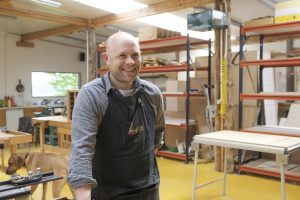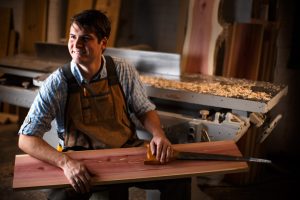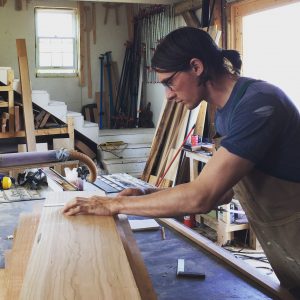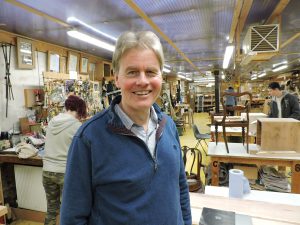[vc_row][vc_column][vc_column_text]Anselm Fraser, principal, writing in The Woodworker magazine
It’s a tough world out there and, alas, there are no shortcuts to becoming a successful woodworker.
At our school, our nine-month professional course equips students with all the skills they need to set up in business as fine furniture designers.
As part of the course, we also make sure that students understand the basics of business planning and marketing. Those are the two fundamentals that underpin success.
It’s our way of making sure that our students graduate with realistic expectations and an understanding that success takes perseverance.
So what are some of the pitfalls? Let some of our former students give some advice.

Scotland-based Ewan Ogilvie studied with us between 2012 and 2013, and cautions woodworkers to only design and create to the highest standards.
“Your previous customers can be your best advertisers,” he says. He also warns students to have realistic expectations when they graduate.
“It’s a fantastic way to make a living,” says Ewan, “and I wouldn’t now change it for the world, but establishing yourself in the market takes time and hard work.”

Sam Rouse (2015-2016) from the USA has a more cautionary tale.
After graduation, when he landed back in the USA, he found a voicemail from an interior designer on his phone.
She had a client who had just built a $1million dollar home and who was looking for upwards of 15 pieces of furniture.
Sam immediately set up a workshop in North Carolina. One month later the client disappeared and stole the Interior designer’s designs.
Start small
“That’s how my story starts,” says Sam. “New city, wife, one daughter, no work.
“That’s the bad news. The good news? Three years later I am making furniture at Sam Rouse Furniture and loving it. Although I am still new to woodworking, I have learned so much over the past three years.”
Sam’s advice is to start small to avoid taking on too much debt by buying expensive tools and machinery.
Sam also cautions about pricing. “My first project was a desk that took two months to make and I charged $800. Terrible! But don’t also fall into the trap of over-charging.
“Work out what you need to live and pay the bills, then slowly increase your prices as time goes on. That’s worked for me.”

Gary Staple, Nova Scotia, Canada (2013-2014) also advises new woodworkers to keep their overheads low.
“The first few years will be the most difficult and high overheads can sink a new company. My advice is not to rush out and buy lots of shiny new equipment, but do buy quality in the tools you use the most.”
He also emphasises the importance of pricing. “It’s easy to price too low, but the fact of the matter is that custom furniture is a high-end market product.
He also advises new woodworkers to document everything and take lots of photographs. “The internet is your greatest sales tool, but only your best pieces should make it onto the website. Build your online presence with good content.”
Lastly, Gary also warns new woodworkers to have sensible expectations. “Grow slow, be patient, and don’t rush into your dream workshop until you’re sure you can afford it,” he says.

Mike Whittall, Scotland (2015-2016) was fortunate to ‘hit the ground running’ with a good commission from an ex-colleague. He advises new woodworkers not to underestimate their existing network of friends, relations or former colleagues.
He set up his own workshop at home and made a plan to design and make new furniture, take on restoration work and run woodworking courses.
“The idea was to create three complementary income streams which could fit round each other and show customers a variety of activity. For a creative, this might all sound a bit too much like business speak. But, ultimately, a business was what I needed as well as being an outlet for my creative ideas,” says Mike.
“Just under three years on, the plan is starting to show growth. The commissions are beginning to come, restoration projects are now fairly regular and I have developed a series of weekend courses.
Rewarding
“I won’t pretend it’s been a walk in the park, but that’s the reality for any business start-up.
“To extend an oft-used phrase, this whole thing has been a real journey, both frustrating and rewarding and I wouldn’t change a single thing!” says Mike.
All those students have now made it in the world of fine furniture design and making.
But despite working in different parts of the world, and specialising in different areas of woodworking, their sage advice is much the same.
Be realistic, start small, don’t pile up unnecessary debt on expensive equipment you’ll rarely use.
But, above all, persevere!
[/vc_column_text][/vc_column][/vc_row]
